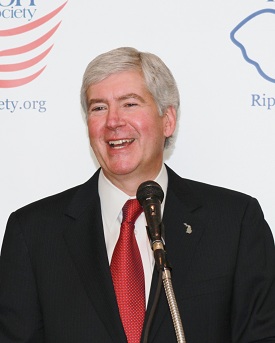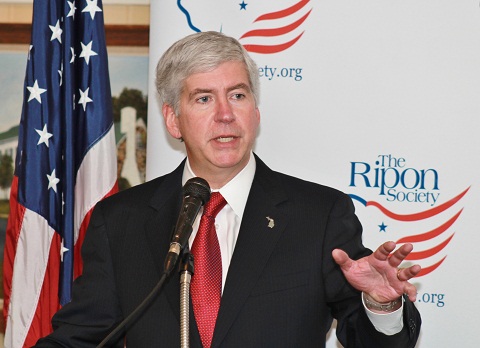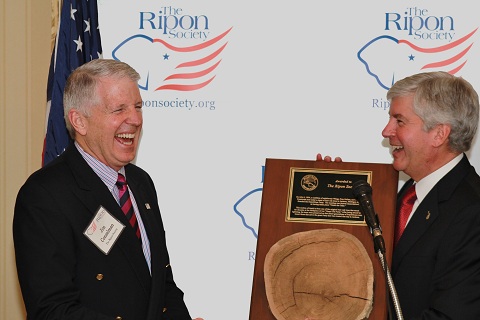Michigan Gov. Rick Snyder Discusses the Importance of Making Government More Responsive and the Principles He Follows
as He Works to Achieve this Goal

WASHINGTON, D.C. – In a speech last Wednesday afternoon to a luncheon meeting of The Ripon Society, Michigan Governor Rick Snyder spoke about the importance of making government at all levels more responsive and accountable to the people, and the principles that he is following in his own state as he works to rebuild the economy and achieve this goal.
“I think the public sector in America is somewhat broken,” Snyder stated. “I think the culture is broken in many respects. So the things we’re doing in Michigan, we’re doing it a different way. I’m following some fundamental principles that I think are making a difference. The first one is the concept of customer service. One of the questions that isn’t asked often enough is why does government exist? We take it for granted. We complain about it. We talk about it. But when was the last time we had a thoughtful discussion about it?
“In Michigan, we defined it. The role of government is customer service. The role of government is to serve our citizens as customers — to make a difference in their lives in a positive way. When I became governor, most of the people who walked in to see me would say, ‘Governor, we need money’ or ‘We want money.’ I never said it, but it went through my mind: ‘What do I look like, an ATM machine?’ That’s not the point of government. The point is to ask what are we going to do for our citizens — our customers — to make a difference in their lives? And then once you agree on something that’s needed, what resources are needed to achieve that outcome? We need to get back to that. That’s one of the fundamental principles.
“The second one is how you approach it. There’s an approach I use all the time — relentless positive action. What is relentless positive action? It’s an operating model that says you don’t blame anyone for anything. You don’t fight with people. You don’t worry about credit. You say, ‘Here’s a problem and let’s solve the problem.’ And when you’re done with that problem, you’re relentless. You ask, ‘What’s the next problem and the problem after that?’ You just get the job done. That’s what we’ve been doing in Michigan. But if you think about it, in Washington, it is a mess. Where would we be if no one in Washington would fight, take blame, or take credit? How much time would we have to solve problems? Isn’t that what we need to do at the national level? Relentless positive action does work. It changes the dynamic dramatically when you’re not going to waste time arguing with someone. Have you ever seen blame solve a problem? It is wasted time and energy.
“A third principle we follow is to work in dog years. That’s not a familiar term to most people. Where did it come from? When you’re at the bottom, you’ve got a lot of work to do. I told our team when we came into office that we had four years’ worth of work to do in the first six months. I thought about it and said, ‘Well, let’s see, four years, six months — the closest I can do is seven to one. Dog years — that’s it! And we believe it and live it. Because the way I view it, it’s an honor being elected governor, being hired by the citizens — the customers — of this state to do this job. And there’s a clock ticking. That clock’s ticking every day to see how much can you get done to make a positive difference to your customers’ lives. And that’s exciting. There is a sense of urgency, because the citizens deserve a better answer than they’ve been given.”
Snyder was elected in 2010 after a very successful career in the private sector, during which he rose to become the President and Chief Executive Officer of Gateway Computer. Currently the only CPA serving as Governor, he also offered his thoughts on the current perception of the Republican Party and the critical role that government can – and should — play in the lives of the less fortunate.

“We’re thought of too often as the party of the businessperson,” he said, referring to the GOP. “Or we just think about jobs and not people. And that’s ridiculous. I’m proud to say that in Michigan, we’re doing a much better job of taking care of our customers, the people who are in the greatest need in our state. That hasn’t been done in a very long time. And we’re not going to stop. We’re going to give them great service because they deserve it. I’ll give you one illustration of a program I’m really excited about. It’s called Pathways to Potential, and it’s customer service 101. What is it? It’s about our case workers and our social workers in human services. The traditional model is that you have a government office some place in some bland office building — quite often you own or rent space. And we tell all our clients or customers to come and visit us. We tell this to people who have to take one, two, or three buses to get there, spend a long time to get there, to go wait in some line to get services.
“And that’s not right. Can you think of any successful business where you tell your customer you’ve got to come to us andyou’ve got to have a huge hassle to get service? It’s crazy. So what did we do? We said we’re going to put those caseworkers, those social workers in the local elementary schools — the public schools in our neighborhoods — and we’ve done that. We’ve already done that in over 100 schools in Michigan. The principle is, they can walk into the local neighborhood. They can walk into the local school that their kids could be going to, and get services right there. That’s customer service. The other difference is that the person can see them in their own environment and see how we can help them in other ways than what they may be just walking in to ask.
“One of our social workers saw this young girl coming to the school in flip-flops walking to school. Now that’s possible — it’s warm enough still. But she starts talking to her and found out that there’s a mother and three other kids, and they’re all homeless. Our social worker was able to get them in a shelter and start helping them. Now they’re in a rental apartment. The mother’s working on completing her GED. She’s working part-time. The brother of that girl was a major problem in school. He’s now won awards in math and attendance. That’s customer service. That’s what we should be doing. It’s cool.”
In response to a question after his remarks, Snyder also shared his thoughts on the Affordable Care Act and, specifically, the deadline later this year when state health insurance exchanges are scheduled to go into effect.
“I don’t know how they’re going to meet their deadline from a systems side,” the Governor observed. “I’ve said that to people within the Administration. To my knowledge they haven’t released a lot of the information to the states to know how our system can interface with the federal systems to do the program. And I can tell you, I used to run Gateway, and I had multi-million dollar IT projects working for me. And as an old IT guy, if I don’t have the specs right now for a project that’s due in six months, I’m terrified because the odds of getting it to work are pretty slim.”
Snyder was also asked about his decision to take over the finances of Detroit.
“The city of Detroit is going to get turned around and it’s going to come back,” Snyder stated. “And it’s about time. The citizens of Detroit deserve a better answer. They’re my customers, too. We need to give them better services. We need to get them financial stability. As part of Michigan coming back to be a great state, we need to have Detroit on the path to being a great city again. I’m not going to sugarcoat this. I don’t think there’s any larger challenge in the United States than the turnaround of the city of Detroit. I don’t think there’s a larger single issue or problem. I’ve not found one person who disagrees with me. That puts it into perspective, but this wasn’t a recent thing in the making. In 1950, Detroit had 1.8 million people. Today, it has probably around 700,000 people. So we’re going to make it happen, and it’s going be something that I think hopefully will be a positive illustration of what Americans can do, and in particular Michiganders and Detroiters can do, when people really focus in on using the principles I talked about.”

The Governor was also asked for his thoughts on unions.
“Unions in Michigan have played a very positive and important role in our history,” he declared. “I mean, there were a lot of bad things that did happen if you go back to the early part of the last century. There were a lot of abuses, and the unions stepped up. Why did people join a union? Because they needed to join a union to address some problems. The issue in many respects is I’m not sure the unions have kept up with the changing environment to fulfill that customer role still for their customers, the union members. So what I would tell you is I believe in collective bargaining — I’ve done collective bargaining. So it’s never an issue of collective bargaining in my view. I’d do it with state employees, I’ve done it more than once, and we’ve been successful with that. I believe we have good relations.
“The freedom-to-work concept — the right-to-work issue, people call it more commonly; I call it freedom-to-work, because it was really a case of stepping up for workers. It’s not an issue of the relationship between the employer and the union, it’s about the relationship about the union and the worker. To be blunt, I’m going to take the worker’s side. And the issue there is people aren’t seeing value from joining the union. The point is that if the union can show value to their customers — their potential members — someone should be happy to join the union and receive the benefits. If they don’t see value, they shouldn’t be forced to pay a whole bunch of their money. It’s too hard. It’s too hard to earn those dollars. So I view it as really stepping up for workers — not being anti-union — and creating a better environment long-term for us to be more successful and more accountable. Again, it gets back to customer service.”
In addition to presenting his remarks, Governor Snyder also made another kind of presentation at the Ripon Society luncheon last Wednesday. Specifically, he presented Ripon Society President Jim Conzelman with a plaque containing a piece of oak from the tree in Jackson, Michigan, where some say the Republican Party was founded.
“I love your concept about what The Ripon Society represents,” Snyder stated, referring to Ripon’s own claim of being the birthplace of the GOP, “but you are geographically and historically challenged!”
The Ripon Society is a public policy organization that was founded in 1962 and takes its name from the town where the Republican Party was born in 1854 – Ripon, Wisconsin. One of the main goals of The Ripon Society is to promote the ideas and principles that have made America great and contributed to the GOP’s success. These ideas include keeping our nation secure, keeping taxes low and having a federal government that is smaller, smarter and more accountable to the people.



